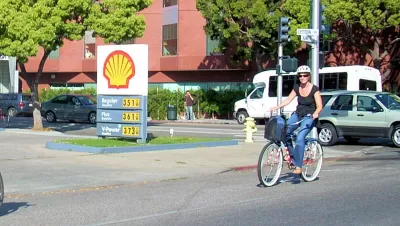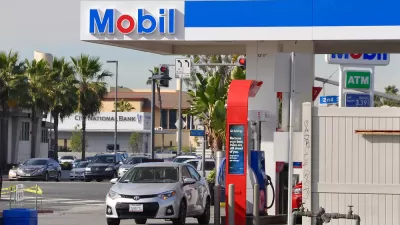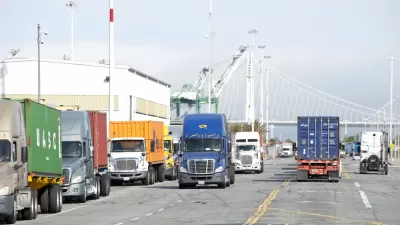Revised transportation funding legislation is needed to meet California's ballooning infrastructure deficit, but it needs a supermajority to pass, and it contains a fatal flaw for clean air activists.

The funding package in Senate Bill (SB) 1 would raise $5.2 billion annually over 10 years, reports Melody Gutierrez for the San Francisco Chronicle. Revenue would come from:
- Increasing the gasoline excise tax, currently 27.8 cents per gallon, by 12 cents per gallon effective November 1, 2017
- Increasing the diesel tax, currently 16 cents per gallon, by 20 cents per gallon, effective November 1, 2017
- Increasing the sales and use surtax on diesel fuel from 1.75% to 5.75%. The total diesel sales and use tax is now 9.25%
- Adds a new, variable transportation improvement fee imposed under the Vehicle License Fee Law [tag: VLF] of between $25 and $175 based on vehicle value and with an inflation adjustment,
- Adds a new a registration road improvement fee of $100 for registration or renewal of every zero-emission motor vehicle model year 2020 (tag: EV fees) and later
[Current tax rates are through June 30, 2017 per Board of Equalization (pdf)]
A vehicle registration fee for all vehicles of $38 was deleted in the March 30 mark-up.
The main obstacle will be reaching the magic two-thirds threshold for passage in both the Assembly and Senate. While Democrats hold a supermajority in both houses, when it comes to gas tax increases, Democrats can take nothing for granted, as noted in an earlier, related post:
... there are divisions in the Democratic party as well that surfaced with SB 350 [in 2015], which the oil industry successfully exploited, resulting in the stripping of the vital oil reduction part of the bill.
So-called "moderate Democrats" were worried that the provision would raise gas taxes, not exactly a good omen for a gas tax bill that will need every Democratic vote to achieve the two-thirds requirement necessary for tax increases.
Revenue would help "tackle a $130 billion-plus backlog in road repairs," reports Jeff Horseman for The Press Enterprise. In addition, $7.5 billion would be directed to public transit, notes The Chronicle's Gutierrez.
However, the two authors, Jim Beall in the Senate and Assembly Transportation Committee Chair Jim Frazier (D-Oakley), will have more than just moderate Democrats to worry about due to a new provision that has upset public health and environmental justice activists, reports Melanie Curry for Streetsblog California.
“This dirty truck provision came out of nowhere,” said Amanda Eaken of the Natural Resources Defense Council, who has been actively engaged in negotiations on the funding package.
The amendment, clearly added at the behest of the trucking industry, would exempt trucks from Air Resources Board regulations and allow them to continue polluting without oversight.
“What it actually does,” said Bill Magavern, policy director for the Coalition for Clean Air, “is undermine the ARB, and a decision just made by the ARB last Thursday” to strengthen its rules on indirect emission sources. “It exempts trucks from that effort.”
Also see "Environmentalists oppose Gov. Brown's transportation plan for giving truckers a break on future pollution rules," by Patrick McGreevy in the Los Angeles Times.
Two decisions by the ARB at that meeting on March 23 in Riverside received far more attention:
- Approving strict motor vehicle emissions standards that put the state in conflict with the Trump Administration
- Approving the nation's strictest
Jim Miller of The Sacramento Bee reports that leaders "have set an April 6 deadline to approve the package."
California last increased its gas tax in 1990 when voters approved Proposition 111, a 9 cents increase over five years. The current state gas tax (excise tax plus other taxes/fees) totals $.3813 per gallon per API (pdf) as of January 1, sixth highest in the nation after Pennsylvania, Washington Hawaii, Connecticut, and New York.
California residents can send letters to their legislators asking that they remove the truck pollution loophole from the transportation legislation via TransForm, an Oakland-based nonprofit that promotes walkable communities.
FULL STORY: Transportation Funding Bill Poisoned by Truck Amendment

Alabama: Trump Terminates Settlements for Black Communities Harmed By Raw Sewage
Trump deemed the landmark civil rights agreement “illegal DEI and environmental justice policy.”

Study: Maui’s Plan to Convert Vacation Rentals to Long-Term Housing Could Cause Nearly $1 Billion Economic Loss
The plan would reduce visitor accommodation by 25% resulting in 1,900 jobs lost.

Planetizen Federal Action Tracker
A weekly monitor of how Trump’s orders and actions are impacting planners and planning in America.

Grand Rapids Mayor Proposes Garage Conversion Plan
The mayor says allowing homeowners to convert garages to dwelling units could alleviate the city’s housing shortage.

Baltimore Ordered to Improve Sidewalk Accessibility
The city is one of many to face lawsuits for failing to comply with the Americans with Disabilities Act.

This Toronto Suburb Has More Bus Riders Than Columbus, Ohio
Brampton, Ontario used gradual improvements in service to prove that if you build it, they will ride.
Urban Design for Planners 1: Software Tools
This six-course series explores essential urban design concepts using open source software and equips planners with the tools they need to participate fully in the urban design process.
Planning for Universal Design
Learn the tools for implementing Universal Design in planning regulations.
Smith Gee Studio
Alamo Area Metropolitan Planning Organization
City of Santa Clarita
Institute for Housing and Urban Development Studies (IHS)
City of Grandview
Harvard GSD Executive Education
Toledo-Lucas County Plan Commissions
Salt Lake City
NYU Wagner Graduate School of Public Service





























